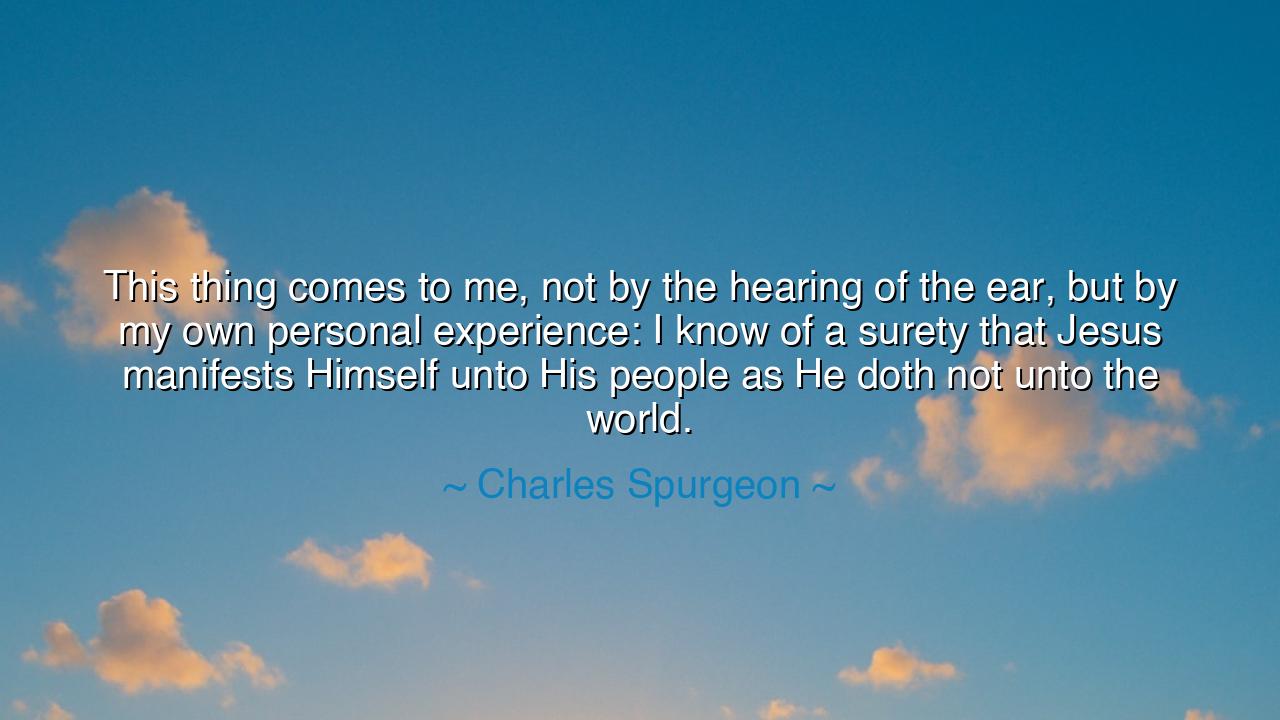
This thing comes to me, not by the hearing of the ear, but by my
This thing comes to me, not by the hearing of the ear, but by my own personal experience: I know of a surety that Jesus manifests Himself unto His people as He doth not unto the world.






In the voice of deep conviction, Charles Spurgeon, the “Prince of Preachers,” once declared: “This thing comes to me, not by the hearing of the ear, but by my own personal experience: I know of a surety that Jesus manifests Himself unto His people as He doth not unto the world.” These words, rich with faith and glowing with the warmth of revelation, speak of the sacred difference between knowing by hearing and knowing by experience. They echo through the corridors of time as a reminder that true understanding of the divine cannot be borrowed, bought, or learned from others — it must be lived, felt, and proven within the heart.
Spurgeon lived in an age when skepticism rose like a shadow over the Western world. Many spoke of faith as though it were but a relic of simpler times, something to be studied rather than experienced. But Spurgeon’s faith was not secondhand. He had walked through valleys of despair, illness, and doubt. In those dark hours, he did not cling merely to doctrine — he clung to the living presence of Christ. Thus he proclaimed, not as a scholar, but as a witness: “This thing comes to me, not by the hearing of the ear.” What he knew of God was not from sermon or scripture alone, but from encounter — a communion that could not be explained to those who have never felt it.
To understand Spurgeon’s words is to grasp the great chasm between knowledge and experience. Hearing is easy; living is hard. Many have heard of love, but only those who have loved deeply know its fire. Many speak of courage, but only those who have faced fear and stood firm know its strength. So too with faith: one may hear of God from a thousand lips, yet remain untouched until the heart itself is pierced by His presence. This is what Spurgeon meant — that Jesus manifests Himself not through argument, but through personal revelation. His light does not simply shine upon His people; it shines within them.
Consider the story of John Newton, once a slave trader, whose heart was as hard as the iron chains he sold. It was not through sermons that he was changed, but through experience — a storm at sea that broke his pride and made him cry out for mercy. In that hour, Newton did not hear of grace; he met grace. He went on to write the immortal hymn “Amazing Grace,” testifying like Spurgeon that what he knew of God came not from hearing, but from living it. From that moment on, he walked with the quiet strength of one who had seen what the world could not — Christ manifest to the contrite heart.
Spurgeon’s wisdom, then, is not a call to abandon learning or worship, but to seek encounter over echo. The world is filled with those who recite truths they have never tasted, who speak of peace yet know no stillness. But those who truly know God — the humble, the broken, the steadfast — carry within them a light that cannot be extinguished. They are not swayed by doubt or circumstance, for their faith is not borrowed; it is anchored in experience. When they speak of Christ, they speak as one who has walked beside Him, not merely read of Him.
The lesson is timeless: seek to know, not merely to hear. Let your faith be tested in the fires of life. When sorrow comes, meet it with prayer; when silence lingers, wait in trust; when joy breaks forth, give thanks with a full heart. For it is through these moments — the trembling, the triumph, the tears — that the Divine reveals Himself. The scriptures may guide you to the door, but only experience opens it. Only through living faith does one behold the truth Spurgeon knew so deeply: that Jesus manifests Himself to His own, and that His presence is the greatest proof of all.
So, to those who seek wisdom and light: do not be content with the hearing of the ear. Step into the life of the spirit where truth becomes touch, where hope becomes vision, where belief becomes knowing. As Spurgeon taught, the world may hear and not understand — but those who have felt the divine hand upon their hearts carry a certainty that no darkness can undo. For they have not merely read of the sunrise — they have stood in its light.






AAdministratorAdministrator
Welcome, honored guests. Please leave a comment, we will respond soon